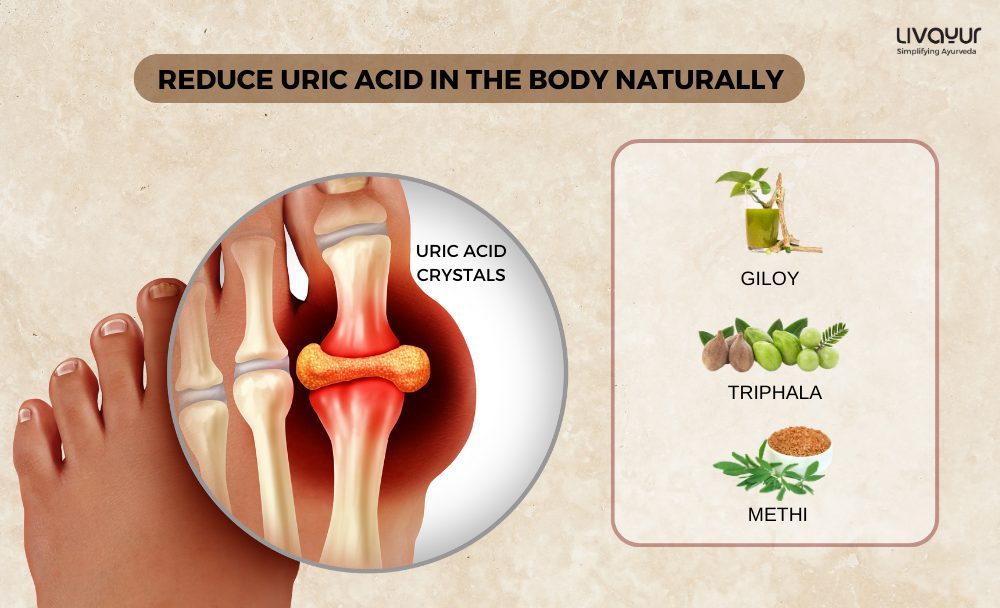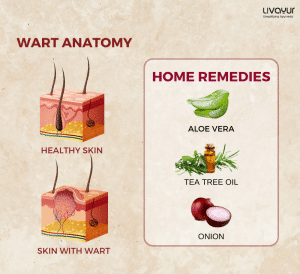
Have you ever wondered about the invisible culprit behind conditions like gout and kidney stones? Uric acid is a compound that plays a crucial role in our bodies but can also cause trouble when levels go awry.
It is a waste product formed when the body breaks down purines, substances found naturally in the body, and certain foods. Most commonly, it dissolves in the blood, passes through the kidneys, and leaves the body through urine. However, when there is an excess of uric acid or if the body can’t eliminate it efficiently, it accumulates, leading to potential health issues.
In normal amounts, uric acid dissolves in the blood and is excreted through the kidneys. However, when there is excessive production of uric acid or the kidneys cannot eliminate it efficiently, it can lead to a condition called hyperuricemia. Hyperuricemia can result in the formation of urate crystals, leading to painful conditions like gout. [1], [2] In this article, we will explore natural methods to reduce uric acid levels in the body.
But before going into the natural methods to reduce uric acid we must learn about the major triggers and causes of high uric acid and what happens when the uric acid levels are pretty high.
What causes high uric acid?
Various factors can disrupt the normal balance of uric acid in the body, leading to its accumulation and causing health complications like gout, kidney stones, or exacerbating underlying health conditions:
- Genetics and Inherited Traits: Some individuals may have a genetic predisposition that leads to higher uric acid production or reduced elimination. [19]
- Dietary Habits: Consumption of purine-rich foods, such as liver, game meat, anchovies, and sardines, can elevate uric acid levels. Apart from this, excessive intake of fructose, often found in sugary sodas and certain foods, contributes to this increase. [20]
- Alcohol Consumption: Drinking excessively can impede the body’s ability to process and eliminate uric acid, leading to elevated levels. [21]
- Medications and Drugs: Certain medications like diuretics (water retention relievers) [1], niacin (vitamin B-3), immune-suppressing drugs, and some chemotherapy medications can elevate uric acid levels.
- Health Conditions: Various health issues, including high blood pressure (hypertension), kidney problems, metabolic syndrome, obesity, polycythemia vera, psoriasis, leukemia, and tumor lysis syndrome, can contribute to increased uric acid levels.
Symptoms of high uric acid
Some symptoms of high uric acid in the body include:
- Joint Discomfort: Experience pain or soreness in joints, often accompanied by swelling and pain localized in areas like the big toe, ankle, or knee. Redness around the joint might also be noticeable.
- Inflamed Joints: The affected joint might feel warm to the touch due to inflammation.
- Single Joint Affliction: Swelling and discomfort that specifically impact only one joint in the body.
- Distinctive Skin Changes: Skin around the affected joint may appear shiny, displaying shades of red or purple.
- Intense Lower Back Pain: Experience severe, intermittent pain along the lower back that alternates between worsening and improving. This discomfort might radiate toward the genital area.
- Gastrointestinal Symptoms: Encounter feelings of nausea and episodes of vomiting.
- Urinary Urgency and Changes: Notice a sudden, urgent need to urinate and observe blood in the urine.
What should be the normal uric acid range?
The following table shows what level of uric acid in the body is considered normal and what is not:
| Category | Uric Acid Levels (milligrams per deciliter, mg/dL) |
| Normal | Men: 3.4 – 7.0 mg/dL, Women: 2.4 – 6.0 mg/dL |
| Borderline High | 7.1 – 7.9 mg/dL |
| High | Above 8.0 mg/dL |
How to reduce uric acid naturally?
In the listicle below you will learn about the natural ways to lower uric acid.
1. Drink Plenty of Water
Staying hydrated is crucial for maintaining optimal uric acid levels. Drinking an adequate amount of water helps dilute uric acid and promotes its excretion through urine. It also aids in maintaining kidney function, which is essential for eliminating excess uric acid. For regions where hot and humid weather is common, it becomes even more important to drink enough water throughout the day. [3]
2. Consume a Balanced Diet
A. Limit Purine-Rich Foods:
Foods high in purines can increase uric acid levels in the body. It is advisable to reduce the consumption of purine-rich foods, such as organ meats (liver, kidney), seafood (shellfish, anchovies), red meat, and certain vegetables (asparagus, spinach, mushrooms). Instead, opt for lower purine alternatives like low-fat dairy products, whole grains, and lean proteins. [4], [5]
B. Increase Plant-Based Foods
Including more plant-based foods in your diet can be beneficial in reducing uric acid levels. Fruits and vegetables, particularly those rich in vitamin C, have been shown to lower uric acid levels. Citrus fruits, berries, bell peppers, and leafy greens are excellent choices. [6], [7]
C. Moderate Fructose Intake
Excessive intake of fructose can lead to higher uric acid levels. It is advisable to limit the consumption of sugary beverages, fruit juices, and processed foods that contain high fructose corn syrup. Choose fresh fruits instead, but consume them in moderation. [8]
3. Maintain a Healthy Weight
Being overweight or obese increases the risk of developing hyperuricemia and gout. Losing weight through a combination of a healthy diet and regular exercise can help reduce uric acid levels. It is important to follow a balanced and sustainable weight loss plan that focuses on portion control, nutrient-rich foods, and increased physical activity. [9]
4. Regular Exercise
Engaging in regular physical activity has multiple benefits for individuals with hyperuricemia. Exercise helps in weight management, improves insulin sensitivity, and enhances overall cardiovascular health. It is important to choose exercises that are low impact and do not put excessive stress on the joints, as gout often affects the joints. Activities like walking, swimming, and yoga can be excellent choices. [9]
5. Herbal Remedies
Certain herbs and spices have been traditionally used for their potential to reduce uric acid levels. These include:
- Giloy (Tinospora cordifolia): Known for its anti-inflammatory properties, giloy can aid in reducing uric acid levels. [10]
- Triphala: A combination of three fruits, namely amalaki, bibhitaki, and haritaki, triphala is believed to have detoxifying effects and may help in managing uric acid levels. [11], [12]
- Methi (Fenugreek): Methi seeds or leaves are known to have antioxidant properties and may help in reducing uric acid levels. They can be consumed soaked in water or ground into a powder and added to your meals. [13]
6. Limit Alcohol Consumption
Alcohol, especially beer, is known to increase uric acid production and decrease its excretion. It is advisable to limit or avoid alcohol consumption, particularly for individuals with hyperuricemia or a history of gout. If you do choose to drink alcohol, opt for moderate amounts of wine or spirits and stay well hydrated. [14]
7. Reduce Stress
Chronic stress can contribute to increased uric acid levels in the body. Incorporating stress management techniques like meditation, deep breathing exercises, yoga, or engaging in hobbies can help lower stress levels. Prioritizing relaxation and self-care is crucial for maintaining overall health, including uric acid balance. [15]
8. Ayurvedic Treatment
Ayurveda offers various treatments to help reduce uric acid levels. Therefore, you would be interested to know how to reduce uric acid with Ayurveda. Consulting an experienced Ayurvedic practitioner can provide personalized recommendations based on your Dosha (constitution) and specific health needs. Some commonly recommended Ayurvedic treatments include Panchakarma therapies, herbal formulations like gokshura churna, and lifestyle modifications. [16], [17], [18]
When to seek medical advice?
It is important not to rely solely on natural remedies if you have a severe or persistent condition. You must see a doctor in the following cases:
- If you are experiencing recurrent gout attacks or have concerns about your uric acid levels
- If you experience symptoms such as severe joint pain, swelling, or redness in joints, especially the big toe, ankle, or knee, it’s essential to consult a healthcare professional.
- If you have a history of gout or kidney stones and notice a recurrence of symptoms like sudden and severe pain, seeking medical attention is advisable.
- The presence of blood in urine, persistent lower back pain, or any unusual changes in urinary habits warrant medical evaluation.
- If your blood tests reveal consistently high or borderline high uric acid levels, discussing these results with a healthcare provider is crucial for further assessment and guidance.
- If you are taking medications known to affect uric acid levels and experience unexpected side effects or new symptoms, consulting a doctor is recommended.
- For individuals with conditions like hypertension, kidney disease, or metabolic syndrome, regular monitoring and discussion with a healthcare professional about uric acid levels are important.
FAQs
1. Can alcohol consumption affect uric acid levels?
Yes, alcohol consumption, especially beer, can contribute to increased uric acid levels. Beer contains purines and can also impair the excretion of uric acid from the body. It is advisable to limit or avoid alcohol, particularly for individuals with hyperuricemia or a history of gout. Moderate consumption of wine or spirits is generally considered less harmful, but it is important to stay well hydrated.
2. How long does it take to see a reduction in uric acid levels?
The time required to see a reduction in uric acid levels can vary depending on various factors, including the severity of the condition, individual metabolism, adherence to lifestyle changes, and any underlying medical conditions. Some individuals may experience a gradual decrease over a few weeks or months, while others may require more time. It is important to be patient and consistent with the recommended lifestyle modifications.
3. Can Ayurvedic treatments effectively reduce uric acid levels?
Ayurveda offers various treatments to help manage uric acid levels, but the effectiveness may vary from person to person. Ayurvedic treatments, such as Panchakarma therapies and specific herbal formulations, are believed to have detoxifying and balancing effects on the body. Consulting an experienced Ayurvedic practitioner can provide personalized recommendations based on your specific needs and constitution.
4. Are there any side effects of natural methods to reduce uric acid levels?
Natural methods to reduce uric acid levels, such as dietary changes, herbal remedies, and lifestyle modifications, are generally safe. However, individual responses can vary, and it is possible to experience minor side effects. For example, some herbal remedies may interact with certain medications or cause gastrointestinal discomfort in some individuals. It is important to consult a healthcare professional or Ayurvedic practitioner before making any significant changes to your routine.
5. Can I stop taking medications once my uric acid levels are reduced?
If you are taking medications prescribed by a healthcare professional to manage uric acid levels or prevent gout attacks, it is important to follow their guidance regarding medication usage. It is generally not recommended to stop medications abruptly without consulting your healthcare provider, as this can increase the risk of recurrent gout attacks. Your healthcare professional will assess your condition and advise you on the appropriate course of action.
6. How to reduce uric acid with dietary supplements?
Certain dietary supplements, such as vitamin C, may help in reducing uric acid levels. However, it is important to consult a healthcare professional before taking any supplements, as they can interact with medications or have varying effects on individuals. It is always best to obtain essential nutrients from a balanced diet rather than relying solely on supplements.
Conclusion
Reducing uric acid levels naturally requires a holistic approach that includes dietary modifications, lifestyle changes, and maintaining a healthy weight. By following these ‘how to reduce uric acid in body home remedies’ , individuals in India can effectively manage their uric acid levels and reduce the risk of painful conditions like gout. It is important to remember that everyone’s body is unique, so it may take time to find the right balance of lifestyle changes that work for you. Prioritize a healthy and balanced approach to overall well-being, and consult a healthcare professional for personalized guidance and support.
Disclaimer
This Article is for informative purposes only and does not constitute medical advice. Kindly contact a medical professional before attempting any treatments mentioned in the article yourself.
References:
- Hyperuricemia – StatPearls – NCBI Bookshelf
- Gout and Calcium Pyrophosphate Deposition Disease (clevelandclinicmeded.com)
- Taurine decreased uric acid levels in hyperuricemic rats and alleviated kidney injury – ScienceDirect
- Determination of total purine and purine base content of 80 food products to aid nutritional therapy for gout and hyperuricemia: Nucleosides, Nucleotides & Nucleic Acids: Vol 39, No 10-12 (tandfonline.com)
- The Association between Purine-Rich Food Intake and Hyperuricemia: A Cross-Sectional Study in Chinese Adult Residents (mdpi.com)
- Uric Acid and Plant-Based Nutrition (mdpi.com)
- Vitamin C Intake and Serum Uric Acid Concentration in Men | The Journal of Rheumatology (jrheum.org)
- Fructose Increases Uric Acid Contributing to Metabolic Syndrome – Herbal, Nutritional and Dietary Strategies to Reduce Uric Acid (lidsen.com)
- Physical exercises and weight loss in obese patients help to improve uric acid – PMC (nih.gov)
- Pharmacological potential of Tinospora cordifolia (Willd.) Miers ex hook. & Thoms. (Giloy): A review (phytojournal.com)
- Free radical scavenging reactions and phytochemical analysis of triphala, an Ayurvedic formulation | Request PDF (researchgate.net)
- Pharmacological and therapeutic effects of triphala A literature review (phytojournal.com)
- Antidiabetic Activities of Fenugreek (Trigonella foenum-graecum) Seeds – ScienceDirect
- The role of alcohol consumption in pathogenesis of gout: Critical Reviews in Food Science and Nutrition: Vol 62, No 25 (tandfonline.com)
- Could Uric Acid Have a Role in Acute Renal Failure? : Clinical Journal of the American Society of Nephrology (lww.com)
- Management of Vatarakta w.s.r. to Gout through Panchakarma | Journal of Ayurveda and Integrated Medical Sciences (jaims.in)
- Effect of panchakarma and Ayurvedic treatment in postpartum rheumatoid arthritis (amavata): A case study – ScienceDirect
- A clinical comparative study of the management of chronic renal failure with Punarnavadi compound – PMC (nih.gov)
- The genetics of hyperuricemia and gout
- The Association between Purine-Rich Food Intake and Hyperuricemia: A Cross-Sectional Study in Chinese Adult Residents
- The Effect of Alcohol on Uric Acid Level in Consumers

























